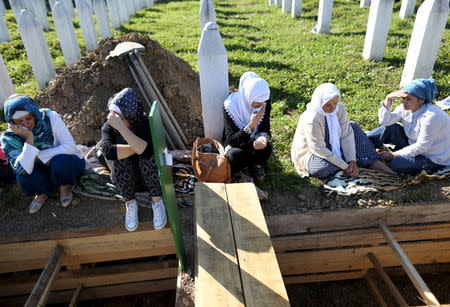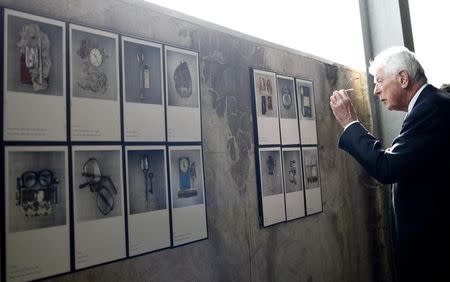Serbia decries "murder attempt" after PM chased from Srebrenica burial
By Daria Sito-Sucic and Maja Zuvela POTOCARI, Bosnia (Reuters) - A mass burial marking the 20th anniversary of the Srebrenica massacre was marred on Saturday when a crowd of mourners chased Serbia’s prime minister from the cemetery, underscoring the depth of anger over Belgrade’s denial of the crime as genocide. Bodyguards drove back a crowd that turned on Aleksandar Vucic moments after he entered the cemetery and laid flowers to 8,000 Muslim men and boys, executed after the U.N. safe haven fell to Bosnian Serb forces towards the end of the 1992-95 war. Stones and bottles were thrown from the crowd, some of whom were heard to cry “Allahu Akbar” (God is greatest), as Vucic’s delegation tried to take cover. Serbia, which backed the Bosnian Serbs during the war with men and money, condemned the attack as an “assassination attempt”. Vucic, without his glasses that he said were smashed, told reporters in Belgrade: “It was not an incident. It was an organised attack.” The attendance of Vucic, a hardline nationalist during the Yugoslav wars, was intended to be symbolic of how far the region has come since the bloody collapse of Yugoslavia. But it came just days after his government enlisted ally Russia to veto a resolution at the United Nations that would have condemned the denial of Srebrenica as genocide. Many Serbs dispute the term, the death toll and the official account of events, reflecting conflicting views on the Yugoslav wars that still feed political divisions and have stifled progress in Bosnia toward integration with western Europe. Under a bright blue sky, the remains of 136 recently identified Muslim Bosniak victims were interred on Saturday, their coffins draped in green cloth and carried by mourners. The bones of more than 1,000 are yet to be found. DIFFERENT FUTURE Vucic had been welcomed by Munira Subasic, head of the Association of Srebrenica Mothers who lost male relatives to the massacre. She pinned a green and white crochet flower, a symbol of Srebrenica, to his lapel. In a book of condolences he wrote: “Here in Srebrenica, it is the obligation of each of us to bow our heads, to not forget and to begin to create a different future”. But in the cemetery, some in the crowd held a banner carrying a wartime quote of Vucic’s: “For every Serb killed, we will kill 100 Muslims”. “I’m sorry some did not recognise my sincere desire to build friendship between Serbs and Bosniaks,” Vucic said after an emergency cabinet session in Belgrade. “My hand remains outstretched to the Bosniak people.” Subasic said she was “terribly disappointed” by the scenes. Serbia said it would send a protest note to Bosnia. “This was a murder attempt on Aleksandar Vucic,” said Interior Minister Nebojsa Stefanovic. Vucic was formerly a disciple of the “Greater Serbia” ideology behind much of the bloodshed that accompanied Yugoslavia’s demise, in which at least 135,000 people died. “Look at him and look at those thousands of tombstones,” said Hamida Dzanovic, who had come to bury two bones identified by DNA as those of her missing husband. “Is he not ashamed to say that this was not genocide?” For years Vucic lionised Ratko Mladic, who led the attack on Srebrenica and is standing trial at the U.N. court in The Hague. He has since rebranded himself as pro-Western, embracing the region’s ambitions of joining the European Union. (Additional reporting by Aleksandar Vasovic in Belgrade; Writing by Matt Robinson; Editing by David Holmes)



